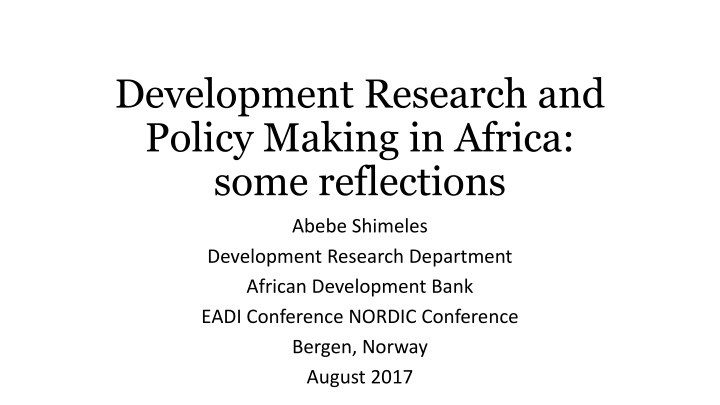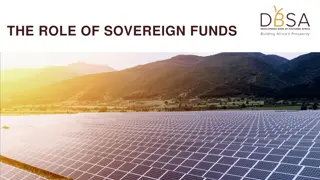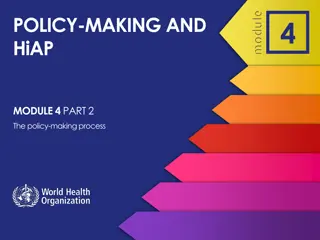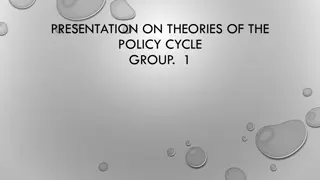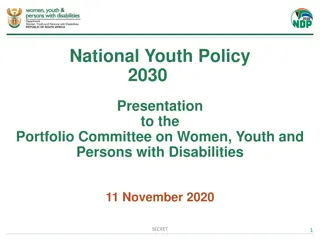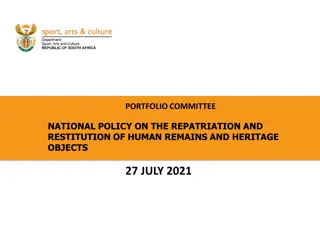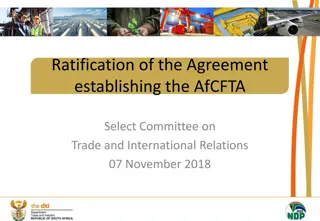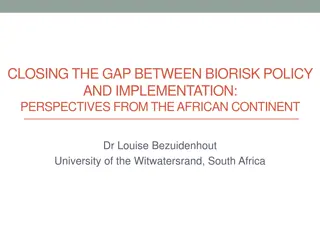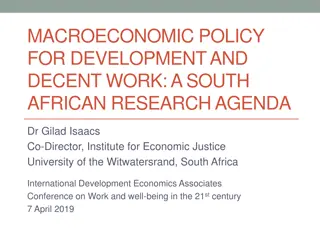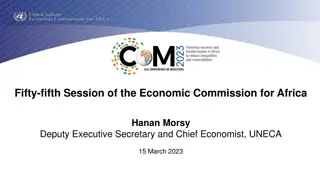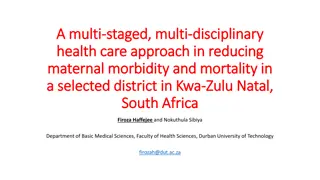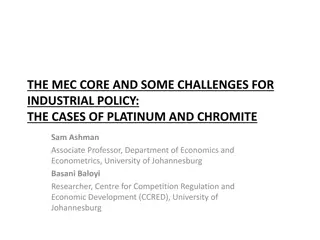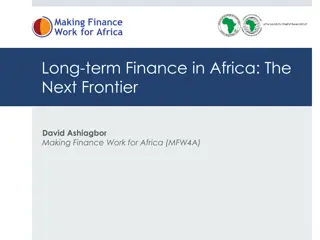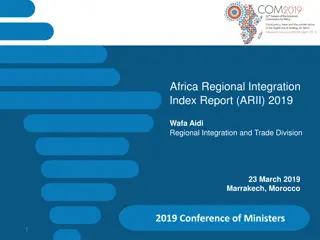Development Research and Policy Making in Africa: Reflections and Challenges
Reflecting on the role of development research in Africa's policy making, this article discusses the importance of homegrown expertise and strong research capacity for sustainable development. It highlights the need for rapid, sustained, and inclusive growth in Africa to address challenges such as poverty, slow growth, and youth unemployment. Emphasizing the necessity of bold and visionary development policies, the article underscores the potential of localized and well-coordinated development research to assist in achieving this goal.
Download Presentation

Please find below an Image/Link to download the presentation.
The content on the website is provided AS IS for your information and personal use only. It may not be sold, licensed, or shared on other websites without obtaining consent from the author.If you encounter any issues during the download, it is possible that the publisher has removed the file from their server.
You are allowed to download the files provided on this website for personal or commercial use, subject to the condition that they are used lawfully. All files are the property of their respective owners.
The content on the website is provided AS IS for your information and personal use only. It may not be sold, licensed, or shared on other websites without obtaining consent from the author.
E N D
Presentation Transcript
Development Research and Policy Making in Africa: some reflections Abebe Shimeles Development Research Department African Development Bank EADI Conference NORDIC Conference Bergen, Norway August 2017
Key issues to be addressed What has been the role of development research in shaping policy making in Africa? Does good policy promote growth and development? Should it change? If so how?
Key messages Africa is at the cross-roads at this moment in history: leapfrog or be overwhelmed. In most African countries the agenda of development policy has been set or heavily influenced by the development community excepting the first decade and half following independence. This has had some successes but also clear failures. To leap frog, policy making cannot be outsourced. Homegrown expertise and strong research capacity are necessary for rapid and sustained development.
Africa it at a cross-road at this moment in history Last two decades have shown strong recovery in Africa: per capita GDP has increased by 25%; in 18 countries it has increased by 50%, in about ten countries it has doubled. Yet poverty is still widespread and is declining slowly (Figure 1) Growth has also been more episodic than sustained (Figure 2)
Figure 1: Despite good growth during 1995- 2010, poverty reduction has been slow in Africa 80 60 Headcount 40 20 0 1980 1990 2000 2010 YEAR East Asia Latin America South Asia Central Europe Middle East & NA SSA
Figure 2: growth sustainability have improved but a lot is needed Proportion of countries with growth acceleration .25 .2 .15 .1 .05 0 1962 to 1966 1967 to 1971 1972 to 1976 1977 to 1981 1982 to 1986 1987 to 1991 1992 to 1996 1997 to 2001 2002 to 2006 period
Rapid, sustained and inclusive growth is needed in Africa Africa has the potential to grow at 10+ a year. And that is also a growth rate it needs to turn the tide of rising population, youth unemployment and inequality. But it needs to put its acts together in designing and implementing bold and visionary development policies. This can be assisted by localized, well coordinated and implemented development research: examples include that of China, India, South Korea, Chile, Brazil, etc as each country self-discovers the shining path to prosperity.
The current practice of outsourcing development policy should and must change The wholesale applications of one-size fits all development policy should be revisited: import- substitution strategies, structural adjustment programs, poverty reduction strategy papers, etc all have short-changed policy making in Africa. MDGs, SDGs are excellent ideas. But they need not replace local development priorities.
Is good research good for policy? We can give several examples of bad research influencing policy Education policy in Africa has for along time been formulated on faulty research about the role of primary education as instrument to reduce poverty and inequality So much of agricultural policy relied on faulty research, Labour is much less productive in agriculture; Women provide the bulk of labour in agriculture; African farmers use less modern inputs; Commercialization of agriculture enhances nutrition; Non-farm income exists for survival; Land markets play a minor role in the development of agriculture
Policy Reforms in critical areas could be helpful for development Empirical evidence is lacking on how policy reforms could impact growth or development. There are however now emerging localized research based on field experiment data or quasi-experimental research However, there are strong correlations between improved business environment and corruption (Figures 3a, 3b and c3). Reform could also be growth enhancing (Figure
Figure 3a: strong correlation between competitiveness and governance 100 80 Ranking in competitiveness 60 40 20 0 0 20 40 60 80 Mo-Ibrahim Index
Figure 3b: the same as Figure 3a but with per capita GDP accounted for 20 Ranking in competitivenessRes 0 -20 -40 -20 -10 0 10 Mo-Ibrahim IndexRes
Figure 4: Reform could enhance growth .1 Equatorial Guinea Equatorial Guinea Equatorial Guinea Equatorial Guinea Equatorial Guinea Ethiopia Ethiopia Ethiopia Ethiopia Ethiopia Angola Angola Angola Angola Angola Malawi Malawi Malawi Malawi Malawi .05 Rwanda Rwanda Rwanda Rwanda Rwanda Sudan Sudan Sudan Sudan Sudan Cape Verde Cape Verde Cape Verde Cape Verde Cape Verde Uganda Uganda Uganda Uganda Uganda Egypt Egypt Egypt Egypt Egypt Mauritius Mauritius Mauritius Mauritius Mauritius Mozambique Mozambique Mozambique Mozambique Mozambique Ghana Ghana Ghana Ghana Ghana Morocco Morocco Morocco Morocco Morocco Djibouti Djibouti Djibouti Djibouti Djibouti Sao Tome and Principe Sao Tome and Principe Sao Tome and Principe Sao Tome and Principe Sao Tome and Principe Tunisia Tunisia Tunisia Tunisia Tunisia Zambia Zambia Zambia Zambia Zambia Tanzania Tanzania Tanzania Tanzania Tanzania Growth Gambia Gambia Gambia Gambia Gambia Nigeria Nigeria Nigeria Nigeria Nigeria Congo, Rep. Congo, Rep. Congo, Rep. Congo, Rep. Congo, Rep. Liberia Liberia Liberia Liberia Liberia Congo, Dem. Rep. Congo, Dem. Rep. Congo, Dem. Rep. Congo, Dem. Rep. Congo, Dem. Rep. South Africa South Africa South Africa South Africa South Africa Mali Mali Mali Mali Mali Sierra Leone Sierra Leone Sierra Leone Sierra Leone Sierra Leone Lesotho Lesotho Lesotho Lesotho Lesotho Algeria Algeria Algeria Algeria Algeria Kenya Kenya Kenya Kenya Kenya Namibia Namibia Namibia Namibia Namibia Seychelles Seychelles Seychelles Seychelles Seychelles Togo Togo Togo Togo Togo Benin Benin Benin Benin Benin Guinea Guinea Guinea Guinea Guinea CAR CAR CAR CAR CAR Guinea-Bissau Guinea-Bissau Guinea-Bissau Guinea-Bissau Guinea-Bissau Madagascar Madagascar Madagascar Madagascar Madagascar Niger Niger Niger Niger Niger Swaziland Swaziland Swaziland Swaziland Swaziland Burundi Burundi Burundi Burundi Burundi Gabon Gabon Gabon Gabon Gabon Burkina Faso Burkina Faso Burkina Faso Burkina Faso Burkina Faso Cameroon Cameroon Cameroon Cameroon Cameroon Senegal Senegal Senegal Senegal Senegal Cote d'Ivoire Cote d'Ivoire Cote d'Ivoire Cote d'Ivoire Cote d'Ivoire 0 Botswana Botswana Botswana Botswana Botswana Comoros Comoros Comoros Comoros Comoros Mauritania Mauritania Mauritania Mauritania Mauritania Chad Chad Chad Chad Chad -.05 Eritrea Eritrea Eritrea Eritrea Eritrea -5 0 5 10 Reform
Conclusions (what is to be done?) A chat with Professor Vittorio Corbo, architect of Chilean economic policy: anecdotal evidence from 1996, Africa need to train first class economists . Echoes Milton Friedman s lament often bad policy is a result of poor understanding of economics . Africa should stop outsourcing development research and policy making. Universities, independent think tanks need to take the wheel of policy making in Africa; The development community can also help change perceptions, aspirations for Africa through rigorous research.
